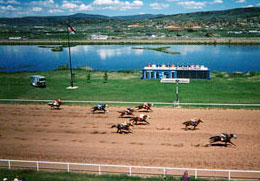- News
- Horse Racing
- Racing Preview
- AQHA Racing Challenge
- Breeding
- Sales
- Quick Stakes Results
- Detail Race Results
- Qualifiers
- Leader Board
- Leading Sires
- Videos
- Auction Leaders
- Q-Racing
Streaming Video
Courtesy Q-Racing

By Richard Chamberlain
Q-RACING JOURNAL—OCTOBER 1, 2014— Historical horse racing is making history in Wyoming. It has revived live horse racing in the Cowboy State.
“Historical horse racing didn’t just breathe new life into Wyoming horse racing, it’s made it better than ever,” said Charles Moore, executive director of the Wyoming Pari-Mutuel Commission . “It’s exciting, it’s tremendously successful, it’s created incredible interest in horse racing. It’s very obvious that it’s something our citizens wanted and are responding to.”
Historical racing (aka Instant Racing) uses previously run horse races replayed on a pari-mutuel wagering terminal. Patrons are given handicapping information, but do not know the specific race or the identity of the horses, trainers, jockeys, owners or tracks. This method has already been used to great success in Kentucky and Arkansas. It also has been approved in Oregon, Texas and Idaho, where Les Bois Park in Boise recently launched its historical racing terminals and projects them to bring in more than $30 million in economic benefits to the state.
Historical racing in the Cowboy State currently operates at Wyoming Downs in Evanston, Sweetwater Downs in Rock Springs and several off-track betting sites in the state. The pari-mutuel wagering game debuted in Wyoming in January, and since then has generated more than $66 million in total handle, more than $664,000 in taxes has been rebated to cities and counties, more than $298,000 has gone into the breeders’ award fund and at least 110 full-time jobs have been created.
“When the legislation was passed (to allow historical racing), there were three main goals: bolster purses, generate funds for breeding horses in this state and create new revenue for the municipalities where it operates,” Moore said. “Well, I am real pleased to report that it has exceeded all our expectations.
“Cities and counties are benefiting, horsemen are the reaping the rewards, the Wyoming Breeders Award Fund has grown exponentially,” he continued. “A few years ago, we were running for purses of $500-$1,000 in Wyoming. This year, it was $4,000 bottoms. Historical racing is bringing back high-quality racing: 20 years ago, we had some of the very best horses and best horsemen in this state and the Northwest region. We had the Diamond Classic (Futurity) – it was the biggest progeny race west of the Mississippi. Now breeders are saying, ‘Wow, Holy Cow, we can afford to do this again!’"
Wyoming Downs on August 10 concluded a highly successful 16-day meet, where in its first full season since 2009 purses for all breeds reached a record $700,000. The track raced only two days in 2013, with purses totaling $40,000. Sweetwater Downs ran a four-day meet in August with $200,000 in purses. The combined 20 days of racing is double what the state had last year and five times the number of days held in 2011 and 2012.
“There was no racing in Wyoming in 2010,” Moore noted. “We’ve just concluded 20 days this year, and there is a possibility of as much as 32 days next year.
“Historical racing is bringing us back to where we used to be and where we need to be,” Moore concluded. “It’s a win-win for everybody involved.”
Look for a feature article on historical racing in the soon-to-be-released October issue of the digital Q-Racing Journal.
AQHA News and information is a service of the American Quarter Horse Association. For more news and information, follow @AQHARacing on Twitter, watch the AQHA Racing Newscast and visit www.aqharacing.com.

 Newsletters
Newsletters Facebook
Facebook